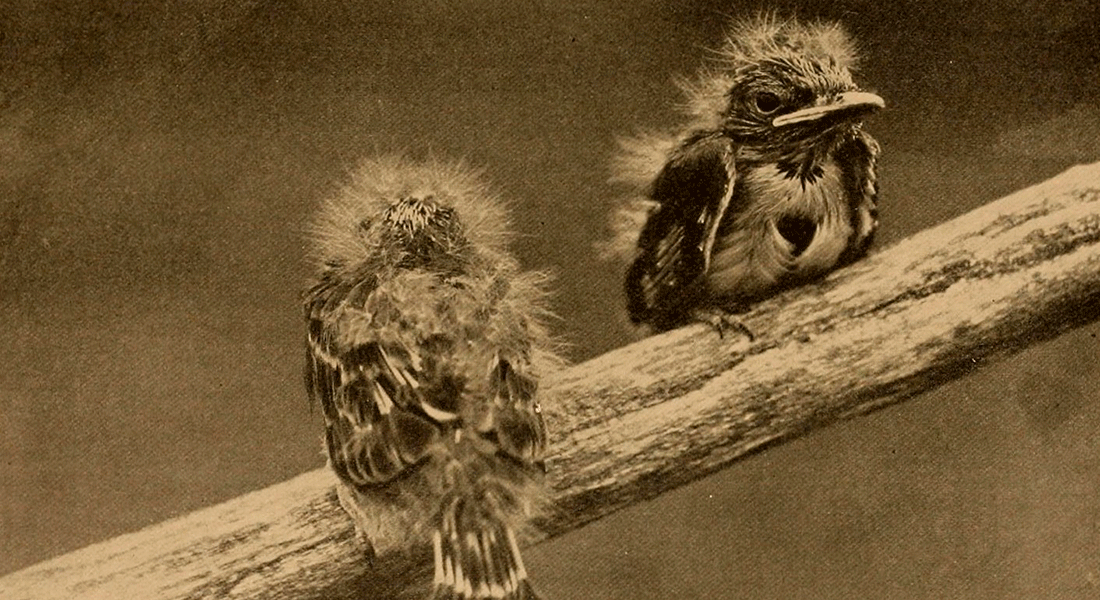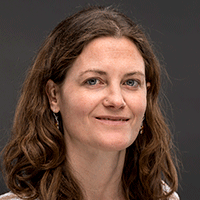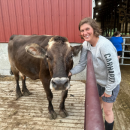Copenhagen Climate Sound Series #2: Sonic Agriculture
Talk with Elodie F. Briefer (University of Copenhagen, Behavioural Ecology Group) and Katy Overstreet (University of Copenhagen, Centre for Sustainable Futures). Moderated by Kara Oehler (Institute for Climate Sound & Society).

In our second event for the Copenhagen Climate Sound Series, we are very excited to host Elodie F. Briefer and Katy Overstreet on the topic of Sonic Agriculture. Dr. Briefer has frequently been in the news since her groundbreaking work on translating pig grunts into actual emotions appeared in the DR documentary ‘Hvis Grise Kunne Tale’ [If Pigs Could Talk]. In years before the documentary, Dr. Briefer and a team of international researchers used thousands of audio recordings of pigs and designed an algorithm to decode whether an individual pig is experiencing a positive emotion (‘happy’ or ‘excited’), a negative one (‘scared’ or ‘stressed’) or somewhere in between. The recordings were collected in a wide range of situations encountered by commercial pigs, both positive and negative, from when they are born until their deaths.
When the study was published in 2022, Dr. Briefer said it demonstrated “that animal sounds provide great insight into their emotions. We also prove that an algorithm can be used to decode and understand the emotions of pigs, which is an important step towards improved animal welfare for livestock.”
At the time, there was even talk of an app for farmers “so farmers could listen to improve the welfare of their animals,” says Elodie Briefer. "We have trained the algorithm to decode pig grunts. Now, we need someone who wants to develop the algorithm into an app that farmers can use to improve the welfare of their animals.”
In her talk, Dr. Briefer will discuss developments in decoding emotions in animals in captivity. She’ll also dive into ways her lab at KU, the Behavioural Ecology Group, is using machine learning to listen in on the emotional states of other species like hedgehogs and goats, and using sound recording and AI for conservation.
We will also hear from Dr. Katy Overstreet from University of Copenhagen’s Centre for Sustainable Futures. Her current work examines the development of insect farming and eating as a pathway to “green protein” in Denmark. Following the simultaneous proliferation of insects on the farm and the loss of insects in the landscape, this project develops methods and concepts for working with human-insect encounters in Anthropocene landscapes.
The discussion will be moderated by Kara Oehler of the Institute for Climate Sound & Society.
Other speakers will be joining this event and we will update with more information soon.

Elodie F. Briefer
Elodie F. Briefer is an Associate Professor in vertebrate social behaviour, with over 20 years of experience in the field of animal behaviour and more particularly bioacoustics. She has been working on a wide range of species, from songbirds to ungulates, and has published > 75 peer-reviewed papers. Since 2019, she has been leading the Behavioural Ecology Group at the University of Copenhagen. Their main projects combine the topics of acoustic communication, emotions, and social networks, in order to understand how emotions influence communication, how emotions are transmitted between individuals and influence social relationships, and how acoustic communication affects social interactions. They are also very interested in how our research can be used to improve animal welfare and for conservation purposes.
 Katy Overstreet
Katy Overstreet
Katy Overstreet is an Assistant Professor of Environmental Humanities and a core member of the Centre for Sustainable Futures. In her research and teaching, Overstreet is committed to critical engagement with co-species social formations, technoscientific power relations, and livability in the Anthropocene.
Overstreet’s current long-term project investigates how demographic and technoscientific change impacts co-species living and working in America’s Dairyland. In particular, she examines the practices of care and processes of bioindustrialization in encounters between farmers, agricultural experts, cows, gut microbes, and multispecies life in Midwestern landscapes. Furthermore, she is conducting multi-sited ethnographic research on the dilemmas of sustainability and experimentation in efforts to make farm animals more eco-friendly in the US and Denmark.
Overstreet is currently developing a multi-stakeholder collaborative project on the development of insect farming and eating as a pathway to “green protein” in Denmark. Following the simultaneous proliferation of insects on the farm and the loss of insects in the landscape, this project develops methods and concepts for working with human-insect encounters in Anthropocene landscapes. She is also a researcher and participant on the COST Action: ‘LIFT: Lifting farm animal lives – laying the foundations for positive animal welfare.
 Kara Oehler
Kara Oehler
Kara Oehler is Director of the Institute for Climate Sound & Society (ICSS) and an artist-in-residence at Third Ear. Integrating climate and biodiversity journalism and policy with sound-based scientific researchers and artists from around the world, ICSS works in partnership with institutions such as metaLAB(at)Harvard and University of Copenhagen, media organizations such as Museum of the UN’s Sounds Right (Denmark) and Ours to Protect (Ireland). She is also an embedded journalist with the Behavioural Ecology Group at University of Copenhagen and is an active participant in interdisciplinary convenings such as the International Bioacoustics Congress (IBAC). Oehler’s work appears in The New York Times, RadioLab, The Atlantic, Morning Edition, the Center for Investigative Reporting, Museum of Modern Art NY and others and has been recognized by Peabody, Rockefeller United States Artists, Radcliffe Institute for Advanced Study and others. Oehler has led and/or co-founded multiple pioneering, interdisciplinary organizations, including the Institute for Climate Sound & Society, COVID Tracking Project at The Atlantic, metaLAB(at)Harvard, Zeega and UnionDocs Center for Documentary Art.
About the Copenhagen Climate Sound Series
We are very excited to announce a new partnership with Institute for Climate Sound & Society at metaLAB Harvard, whose founder and executive director Kara Oehler is now based in Copenhagen. Our initial project together is the Copenhagen Climate Sound Series, a three-part event sequence hosted by Oehler that brings together pathbreaking scholars and artists working with sound, which has taken on an increasingly crucial role as a medium and research tool for understanding the impacts of climate change, and also as a way for people to engage with and listen to the nonhuman world, expanding our relationship to nature.
Combining the potential of new technologies like passive acoustic monitoring and AI with centuries of Indigenous knowledge and decades of work in fields such as bioacoustics, ecoacoustics, and sound studies, sound is being used to monitor species, support conservation justice, and explore new arenas of human and nonhuman relations. The series will feature pathbreaking leaders across these fields, including Joycelyn Longdon, Jana Winderen and Elodie F. Briefer.
About The Institute for Climate Sound & Society
The Institute for Climate Sound & Society (ICSS) brings together sound-based practices entangled with the climate crisis, offering new ways to sonically gather, analyze and represent data to understand changing ecosystems and decenter humans in public culture. The Institute for Climate Sound & Society supports this growing community and is engaged in innovative research, publishing, and gatherings with the mission to advance new forms of knowledge and expand research impact. We are based in Copenhagen and at the metaLAB at Harvard University.
